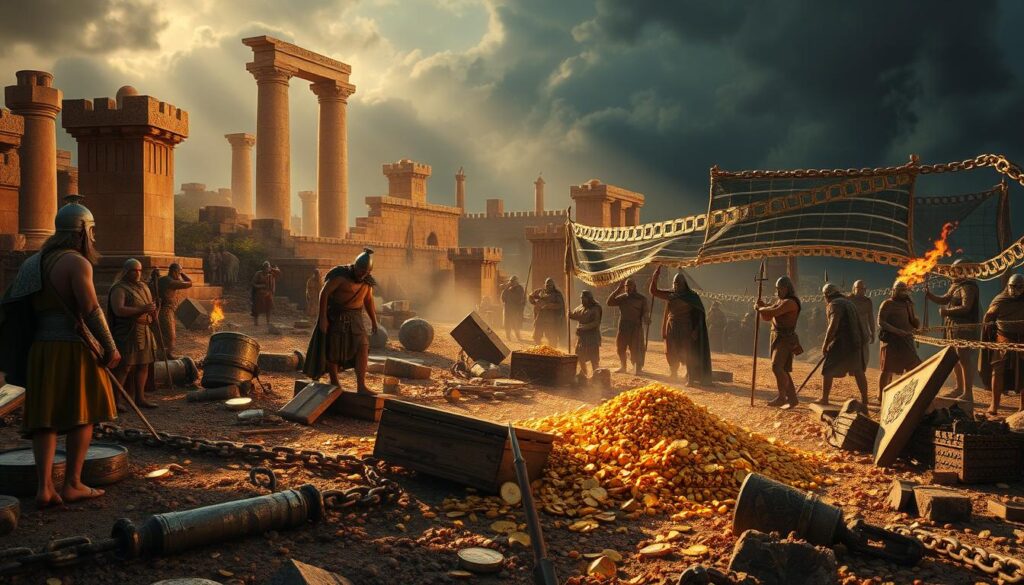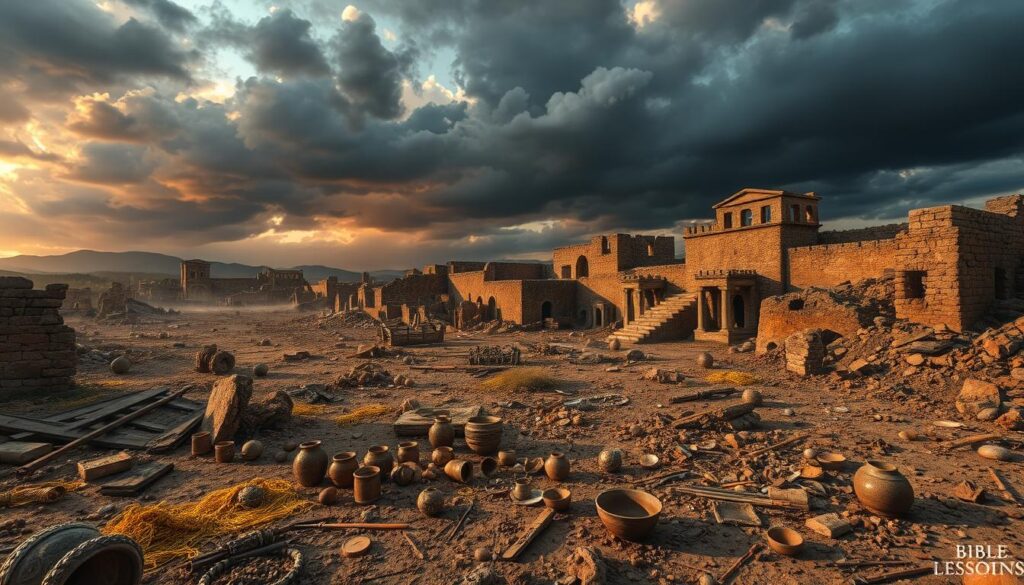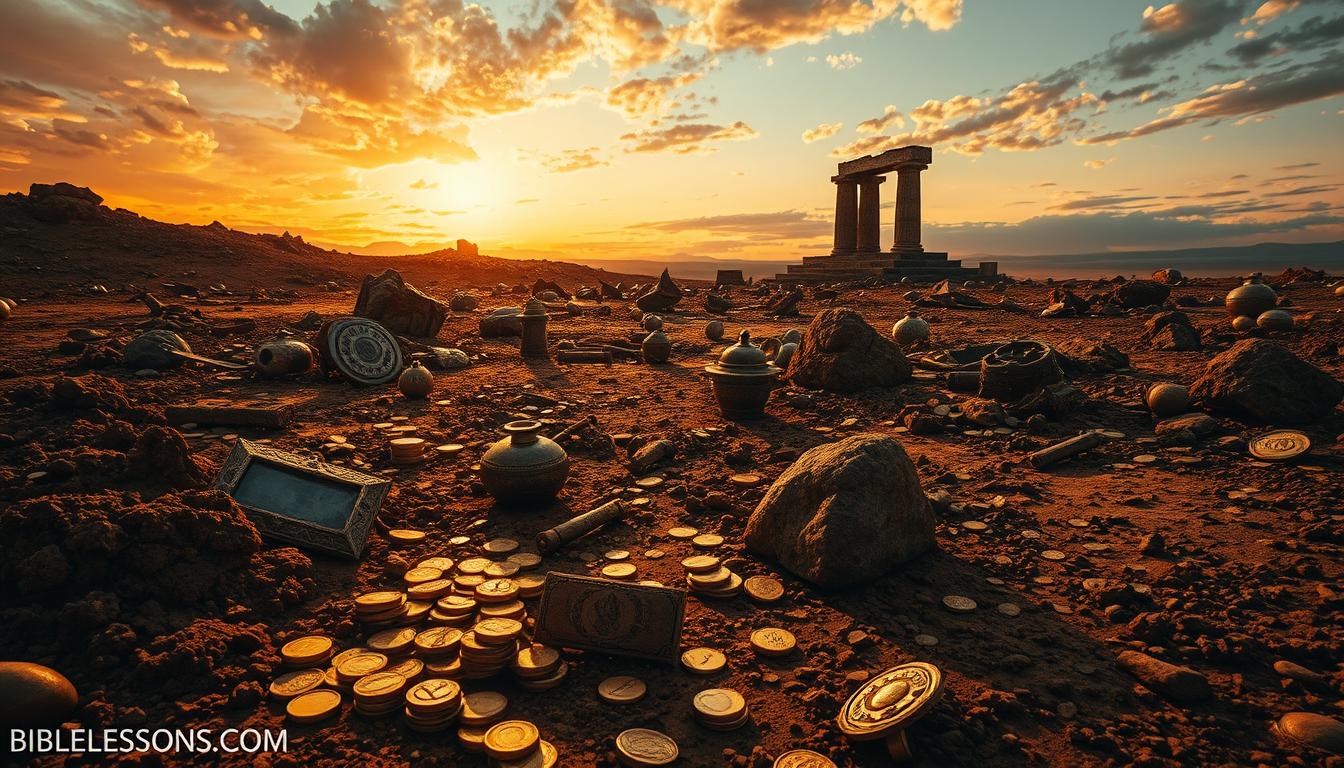The term “plunder” in the Bible often means taking goods, property, and wealth by force. But what does it really mean spiritually? How does it relate to God’s judgment, the effects of sin, and how we use our resources? By looking into the Hebrew and Greek words for “plunder,” we can understand its deeper meaning.
Key Takeaways
- The biblical idea of plunder is about taking things by force, often in war.
- It’s also tied to God’s judgment and the results of sin, showing its spiritual side.
- Learning about “plunder” in the Bible helps us grasp big ideas like greed, fairness, and caring for what we have.
- The original words for plunder in Hebrew and Greek talk about taking away, stealing, and winning the spoils of war.
- Exploring plunder in the Bible helps us see its complex and rich meaning.
Understanding the Biblical Concept of Plunder
In the Bible, plunder was a common practice in ancient times. The Hebrew words like bazaz and shasah mean to take things by force. This often happened during wars when one side took resources from the other.
The Greek words in the New Testament also show plunder as a violent act. Words like diarpazo and harpage describe taking things without permission.
Exploring the Hebrew and Greek Words for Plunder
The Bible talks a lot about plunder, showing its importance in ancient times. These stories tell us about power, resources, and military strength.
“They have taken the choice things and the holy things, and have filled their houses with the spoils.” (Joshua 7:21)
This quote from Joshua shows how plunder was seen in the Bible. The winners took not just things but also sacred items. This shows how wide-ranging plunder was.

Looking into the Hebrew and Greek words for plunder helps us understand its role in the Bible. It shows us the cultural importance of plunder in ancient times. This knowledge helps us see the moral and ethical implications of plunder today.
Plunder as an Act of Warfare and Conquest
In the Old Testament, plunder was a result of war and conquest. When the Israelites won battles, they took the spoils of war. This included livestock, valuables, and captives. The biblical accounts show how these plundered goods were divided and given out as rewards for military conquest.
For instance, during a fight against the Midianites, Moses led twelve thousand warriors. Each tribe sent a thousand men. The battle killed all Midianite males, including their five kings. The Israelites took the women and children as slaves and took all their stuff, like cattle, flocks, and goods.
| Plunder Seized from the Midianites | Quantity |
|---|---|
| Livestock | 675,000 sheep |
| Cattle | 72,000 |
| Donkeys | 61,000 |
| Young women | 32,000 |
But the Bible also condemns the abuse of power and the unjust seizure of property in war. The stories of plunder in the Old Testament remind us of the dangers of corruption. They show the importance of fair and just leadership during war.

“The Israelites took the women and children of Midian as slaves and seized all their possessions, including cattle, flocks, and goods.”
The biblical view on plunder in warfare and military conquest shows the complexity of human conflict. It points out the difficulty of staying moral when tempted by power and wealth.
Plunder and Divine Judgment
The Bible shows us a serious side of plunder as a result of God’s judgment. When people, like the Israelites, ignored God and did wrong, their enemies would take their things as punishment. This idea of plunder as a punishment is seen in many stories. These stories tell of losing things and making sacred places unclean because of sin.
In 1 Samuel, God tells the Israelites to destroy the Amalekites completely, including their animals and belongings (1 Samuel 15:3). This was because the Amalekites had attacked the Israelites without reason. The prophets also warned of plunder and destruction if people didn’t follow God and were morally corrupt.
The Bible warns us about the dangers of ignoring God. It reminds us that our choices have spiritual consequences. God’s justice and holiness require us to act righteously. The stories of plunder as punishment show God’s response to plunder and His wish for His people to be faithful.
“For if we go on sinning deliberately after receiving the knowledge of the truth, there no longer remains a sacrifice for sins, but a fearful expectation of judgment, and a fury of fire that will consume the adversaries.” (Hebrews 10:26-27)
Thinking about plunder and divine judgment in the Bible challenges us to look at our lives. We must try to follow God’s will and avoid the bad outcomes of ignoring Him.

The Spiritual Meaning of Plunder
Plunder as a Consequence of Sin
The Bible sees plunder as more than just taking things. It’s a sign of sin’s impact. Greed, idolatry, and disobeying God can lead to losing everything.
Plunder shows us the value of living right and following God’s rules. When we don’t, we face the harsh effects of plunder. Many stories in the Bible show this.
- In 1 Chronicles 20, King David’s army captured a great quantity of plunder from the city of Rabbah, highlighting the spoils of war that can result from sin.
- 1 Chronicles 26:27 mentions that some of the plunder taken in battle was dedicated for the repair of the temple of the Lord, demonstrating the spiritual significance of plunder.
- The command in Deuteronomy 13:16 to completely burn towns and their plunder as a whole burnt offering to the Lord underscores the connection between plunder and divine judgment.
The New Testament also talks about plunder’s spiritual side. In Mark 3:23-27, it’s about taking from Satan’s control.
“But no one can enter a strong man’s house and plunder his goods, unless he first binds the strong man. Then indeed he may plunder his house.” (Mark 3:27)
The idea of plundering nations to build a new Temple is key. It shows the Church’s mission to change cultures and fight against plunderers. This fight is a big part of the Bible’s story.

What Does Plunder Mean in the Bible?
Plunder has been used since 1632. It means taking goods or property by force, often in war. The Bible shows plunder as taking from the weak by the strong.
In the Bible, plunder is linked to God’s judgment. It happens when people disobey God. This teaches us about living right and following God’s commands.
Understanding the Meaning of Plunder in Scripture
Plunder in the Bible has many meanings. It can be punishment for the wicked. But it also serves God’s greater plans, like judging a nation.
| Verb Definitions | Noun Definitions |
|---|---|
|
|
Understanding plunder in the Bible helps us see why living right is important. It shows us the harm of sin and the rewards of following God.

“Plunder” is associated with acts of pillaging and theft as evidenced in examples from major museums acknowledging ties to histories of violence and plunder according to Leslie Camhi in The New Yorker on October 11, 2024.
Plunder and the Sin of Greed
The Bible links plunder to greed and the pursuit of unfair gain. It warns against covetousness and the love of money. These warnings are found in both the Old and New Testaments.
Plunder is seen as a sign of these sinful attitudes. People or nations seek wealth through wrong means. This often hurts others.
The Dangers of Unjust Gain
The Bible says wanting to be rich can lead to temptation. This temptation can cause harm and destruction (1 Timothy 6:6–10). It teaches that being content is better than loving money.
It reminds us that God will never leave us (Hebrews 13:5). The Bible tells us not to chase after too much. It says our life is not about what we own (Luke 12:13–21).
The Bible also warns about the dangers of greed. It says greed is not fulfilling, unlike being content (Ecclesiastes 5:10–13). It advises us to be generous, as it brings more joy than holding onto wealth (Proverbs 11:24).
Greed for unfair gain can destroy us, the Bible warns (Proverbs 1:17–19).
“The love of money is a root of all kinds of evil. Some people, eager for money, have wandered from the faith and pierced themselves with many griefs.” (1 Timothy 6:10)
The Bible also talks about the dangers of too much wealth. It tells the rich to focus on helping others and being generous (James 5:1–3; 1 Timothy 6:17–19). It warns against greedy behaviors to keep the church pure (1 Corinthians 5:11).
The teachings on plunder and greed remind us of the value of contentment and generosity. They show that chasing unfair gain harms us and society. This is a powerful lesson from the Bible.
Plunder and the Defilement of Sacred Things
The Bible talks about plunder in relation to sacred spaces and holy objects. In the Old Testament, invading armies plundered and desecrated temples, shrines, and other sacred sites. They took valuable artifacts and defiled these places. This violation of the divine realm was seen as a grave offense.
One key biblical example of plunder and sacrilege is the Babylonian invasion of Jerusalem. King Nebuchadnezzar’s forces ransacked the Temple of Jerusalem. They took the golden items from the Holy of Holies. This desecration of the holy site deeply offended the Israelites, who felt it broke their covenant with God.
“They set fire to God’s temple and broke down the wall of Jerusalem; they burned all the palaces and destroyed everything of value there.” (2 Chronicles 36:19)
The plunder of sacred spaces wasn’t just for the Israelites. Ancient Near Eastern cultures often looted and desecrated religious sites to show their power. This was a way to weaken the spiritual and cultural roots of the defeated, solidifying the conquerors’ control.
The biblical condemnation of such acts highlights the need to respect religious institutions. The reverence due to God’s holy places is crucial. Defiling sacred spaces was seen as a serious offense, against both people and divine order.
The Plunder of Jerusalem
Jerusalem’s repeated plunder and destruction are among the most tragic events in the Bible. The city, sacred to the Israelites, was ravaged by armies like the Babylonians and Romans. These invasions left the city and its temple in ruins.
Biblical Accounts of the City’s Pillage
The Bible tells a heart-wrenching story of Jerusalem’s pillage. In 586 BC, Nebuchadnezzar of Babylon conquered the city. He destroyed the temple and took its treasures. Later, in 70 AD, the Romans, led by Titus, destroyed the city again, taking many artifacts.
These events were seen as God’s judgment on the Israelites. Losing Jerusalem and its temple was a deep tragedy. It showed the price of disobeying God’s commands.
| Event | Date | Perpetrator | Outcome |
|---|---|---|---|
| Babylonian Siege of Jerusalem | 586 BC | Nebuchadnezzar, King of Babylon | Destruction of the temple, plunder of sacred vessels and treasures |
| Roman Sack of Jerusalem | 70 AD | Titus, Roman General | Leveling of the temple, seizure of countless artifacts as spoils of war |
The stories of Jerusalem’s plunder remind us of the high cost of disobedience. They teach us about the dangers of straying from God’s path. These lessons are still important for believers today.
Plunder and the Call for Repentance
The Bible talks about the harm caused by plunder and the need for repentance and restoration. It shows how prophets and leaders asked people to change their ways. They wanted them to ask for God’s forgiveness so they could be free from their plunderers.
In the Old Testament, especially during the Babylonian captivity, the call for repentance is clear. After Jerusalem was destroyed and plundered, Jeremiah spoke God’s words. He said God would judge but also restore the people if they humbled themselves and obeyed God’s commands.
“‘This is what the Lord, the God of Israel, says: `I will bring my people Israel back from captivity and have them return to the land I gave their ancestors to possess,’ says the Lord.” (Jeremiah 30:3)
The Bible tells us to repent and seek a right relationship with God to overcome plunder. This is a key message in the Scriptures. It gives hope and guidance to those who have been hurt by sin and injustice.
| Key Insights from the Biblical Narrative | Relevance for Today |
|---|---|
|
|
The story of plunder and repentance in the Bible offers valuable lessons for today’s injustices. By learning from history and following God’s path, we can work towards true restoration and reclaim what’s been unfairly taken.
The Contrast Between Plunder and Godly Stewardship
The Bible shows a clear difference between plunder and godly stewardship. Plunder means taking things by force without right. On the other hand, stewardship is about managing and using things wisely. The Bible teaches us to be honest, generous, and to remember that everything belongs to God.
God made the world and everything in it, and He thought it was perfect (Genesis 1:31). Humans were given the job to take care of the earth (Genesis 1:26-28, 2:15). But, humans have not always done a good job, leading to harm to the environment.
“Do not move an ancient boundary stone set up by your ancestors.” (Proverbs 23:10)
The Bible tells us to move away from plunder and towards godly stewardship. This means using less, recycling, and supporting companies that care for the earth. We should also follow biblical teachings on how to manage resources (Matthew 25:14-30).
| Plunder | Godly Stewardship |
|---|---|
| Forcible and unjust seizure of goods and resources | Responsible management and righteous use of possessions |
| Disregard for God’s creation and the needs of others | Honesty, generosity, and recognition that all resources belong to God |
| Exploitation of the environment and private property | Caring for creation and reflecting God’s character |
By following the teachings of godly stewardship, we honor God and take care of His world. We use our resources in ways that help others and spread God’s kingdom (Exodus 12:35-36, Genesis 9:1-2).
Lessons from Biblical Plunder for Today
The stories of plunder in the Bible teach us valuable lessons for today. They show us the importance of justice, generosity, and wise use of what we have. By learning from these stories, we can live in a way that honors these values.
Applying Biblical Principles to Modern Life
One key lesson is the danger of greed. The Bible warns us about the harm of wanting too much and taking from others unfairly. Today, we can use these lessons to make choices that are fair and just.
Another important lesson is the need to protect sacred places and religious practices. The Bible teaches us to respect and keep holy the spaces and traditions that are important to us. Today, we can apply this by protecting our religious communities and cultural sites, and by being good stewards of our resources.
- The Bible also teaches us about the importance of making things right when we have done wrong. When we have taken something unjustly, we are called to make amends and repair the harm we have caused. This is a lesson for us today, reminding us of the need for accountability and healing in our relationships.
- Lastly, the Bible shows us the value of managing our resources wisely. The Israelites were taught to handle their spoils with care, ensuring fairness and preserving sacred items. This principle can guide us in our efforts to protect the environment, distribute wealth fairly, and use technology responsibly.
By learning from the stories of plunder in the Bible, we can better understand how to live in today’s world. We can appreciate the spiritual and ethical aspects of wealth, power, and how we use our resources.
Conclusion
The idea of plunder in the Bible is complex and deep. It shows us important teachings on right and wrong. The act of taking goods by force, often in war or as punishment, is seen as a serious sin.
By learning about the summary of the biblical meaning of plunder, we can live better lives. We can follow the teachings of Scripture more closely.
The key takeaways from studying plunder in the Bible are clear. They teach us about being good stewards, avoiding greed, and the value of kindness. These lessons urge us to use our blessings wisely and to show God’s love, not to harm others.
Understanding plunder in the Bible is crucial. It helps us think differently about power, wealth, and how we use what we have. By exploring the depths of plunder, we can grow in our faith. We learn more about justice, mercy, and God’s kingdom.
FAQ
What is the biblical meaning of “plunder”?
In the Bible, “plunder” means taking things without permission, often in war. It shows God’s judgment when people lose things because of sin.
What are the Hebrew and Greek words used for “plunder” in the Bible?
The Hebrew words for “plunder” are bazaz, shasah, and gezelah. Greek words include diarpazo, sulao, and harpage.
How is plunder portrayed in the Old Testament?
The Old Testament says plunder comes from war. When Israel won, they took spoils. But it also warns against unfair taking of things.
What is the connection between plunder and divine judgment in the Bible?
The Bible links plunder to God’s judgment. When people disobeyed, God let their enemies take their things as punishment.
What is the spiritual meaning of plunder in the Bible?
Plunder in the Bible is about sin leading to loss. It shows the value of living right and obeying God.
How is the concept of plunder connected to the sin of greed in the Bible?
The Bible ties plunder to greed. It warns against wanting things too much and taking them unfairly.
How does the Bible address the issue of plunder in relation to sacred spaces and holy objects?
The Bible talks about armies taking things from temples. This was seen as a big mistake, showing the importance of respecting holy places.
What is the significance of the plunder of Jerusalem in the Bible?
Jerusalem’s plunder is a big deal in the Bible. It shows God’s judgment on Israel’s sins, when armies like the Babylonians took over.
How does the Bible contrast plunder with godly stewardship?
The Bible contrasts plunder with caring for things rightly. It teaches honesty and using what we have for good, not just for ourselves.
What are the key lessons from the biblical concept of plunder for today?
The Bible’s stories about plunder teach us about greed and the need to protect sacred places. They remind us to use what we have wisely and to repent when we’re wrong.

